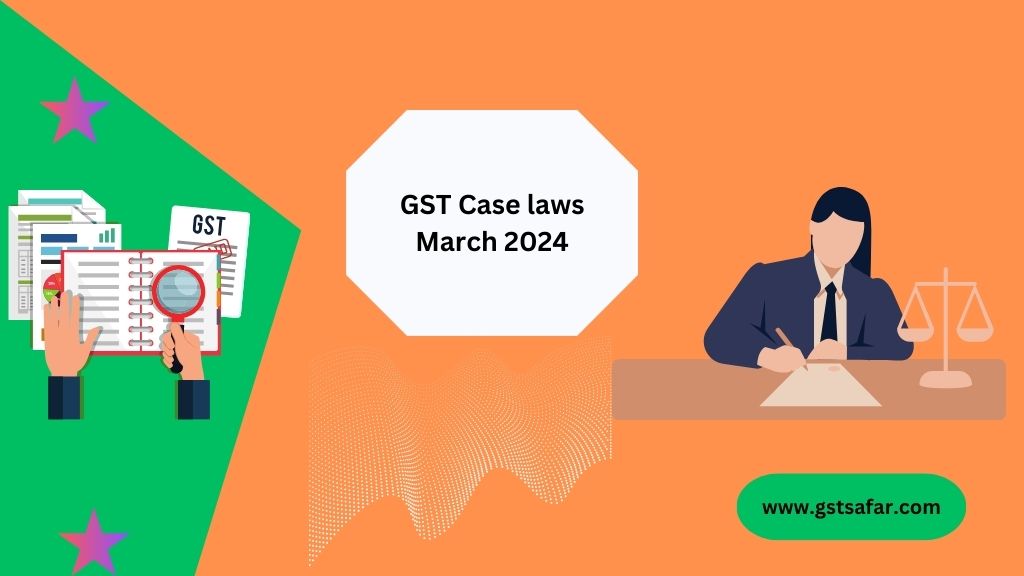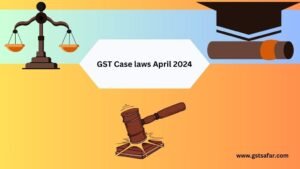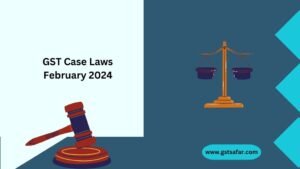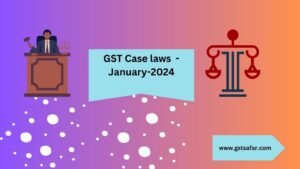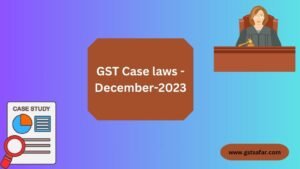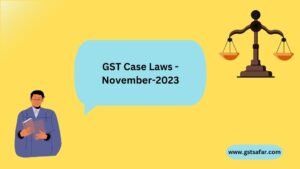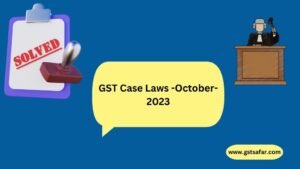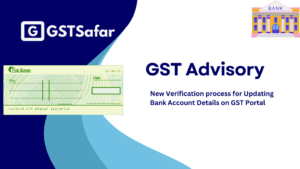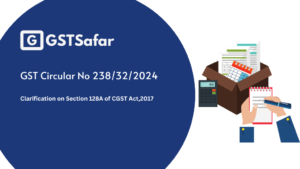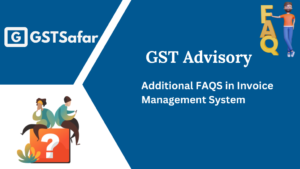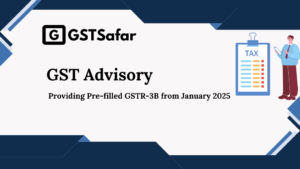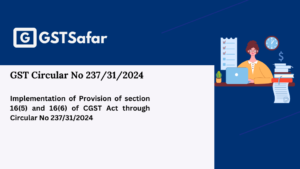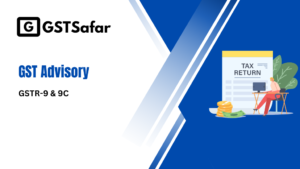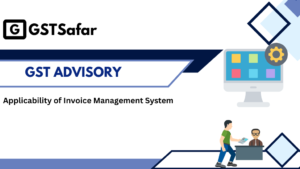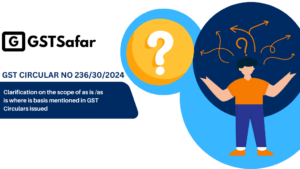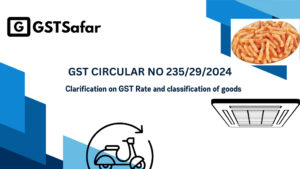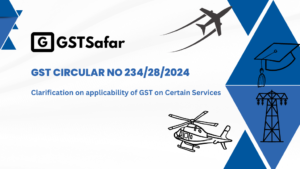The goal of this article is to cover all recent GST case laws 2024. All latest high court judgement on gst and all latest supreme court judgments on gst issued in March 2024 have been covered in this article. All latest GST case laws of March 2024 in this article have been classified by name, date, judge, counsel, GST concept, GST section, etc. In addition, a PDF of the GST case law is provided with the case law so that the user can download it for further study.
GST Case law on Legal Resolution of Discrepancies Between GSTR-3B and GSTR-2B| Recent GST Case law 2024
Madras High Court allowed the petitioner a chance to present their case with supporting documents after paying a percentage of the disputed tax, leading to the cancellation of the previous order.
| High Court : Madras High Court Judgement 2024 |
| Name of case : M/s. Subh Sri Agencies Vs The Deputy State Tax Officer |
| Date of Judgment : 27-03-2024 |
| Appeal No : W.P .N o.8468 of 2024 and W.M.P.Nos.9420 & 9422 of 2024 |
| Judges : THE HONOURABLE MR.JUSTICE SENTHILKUMAR RAMAMOORTHY |
| Counsel Name : Mr.P.Rajkumar |
| Fact of the Case: An assessment order issued on 04.07.2023 was challenged by the petitioner due to a difference in taxes reported in their GSTR 3B returns compared to their GSTR 2B statement. The petitioner claimed this difference was due to how they claimed Input Tax Credit for customs duty.The petitioner’s lawyer argued that their explanation was not properly considered in the assessment order, and they were willing to pay 10% of the disputed tax for a review.Mr. T.N.C. Kaushik, representing the government, mentioned that the appeal time had passed but accepted notice on behalf of the respondent. |
| Held by court : The court noted that the petitioner’s explanation was not fully considered due to lack of supporting documents. However, they agreed to cancel the current order on the condition that the petitioner pays 10% of the disputed tax within two weeks and submits supporting documents regarding their Input Tax Credit claim.If the petitioner meets these conditions, they will have a chance to contest their claim, including a personal hearing. The court expects a new decision within two months after reviewing the documents.The case with reference number W.P.No.8468 of 2024 was resolved based on these terms, with no additional costs incurred. Related matters, specifically W.M.P.Nos.9420 and 9422 of 2024, are now closed. |
| In favor of : Assessee |
| Topic of GST : Reconciliation of Difference between GSTR-3B VS GSTR-2B for ITC claim |
GST Case law on Improper show cause notice| Recent GST Case law 2024
The Madras High Court says e tax authority wrongly stated in the final order that the taxpayer hadn’t submitted any documents and failed to prove the movement of goods.
| High Court : Madras High Court Judgement 2024 |
| Name of case : Sri Kumaran Steels vs. Deputy State Tax Officer-I |
| Date of Judgment : 26-03-2024 |
| Appeal No : W.P.NO.8133 OF 2024 W.M.P.NO. 9083 OF 2024 |
| Judges : SENTHILKUMAR RAMAMOORTHY, J. |
| Counsel Name : Ms. R. Harishni and S. Rajasekar |
| Fact of the Case: The taxpayer, involved in steel contracts, received a notice (Form GST DRC-01A) from tax authorities regarding tax or Input Tax Credit (ITC) discrepancies. The taxpayer responded by providing various documents to prove the authenticity of their transactions. However, a subsequent show cause notice (SCN) was issued without the taxpayer’s knowledge because it was uploaded in a less visible section of the GST portal. The final order was then issued based on this SCN. The taxpayer argues that this violated the principles of natural justice. In essence, the taxpayer claims they were not properly informed about the SCN, which led to an unfair decision being made against them. |
| Held by court : The taxpayer had already responded to the tax authorities with evidence such as invoices, weighment slips, E-way bills, ledger copies, and payment details to dispute their liability. However, the final order incorrectly stated that the taxpayer hadn’t provided any documents and hadn’t proven the movement of goods. This conclusion was unjustified given the documents attached to the taxpayer’s initial response. The taxpayer was then given a chance to respond to the show cause notice, and it was decided that the tax authorities must provide a fair opportunity for the taxpayer. The case was to be reconsidered afresh. |
| In favor of : Assessee (Matter remanded) |
| Topic of GST : Demand |
| Section of GST: Section 73 of CGST Act,2017 |
GST Case law on Hostel Accomdation | Recent GST Case laws 2024
Madras High Court says GST should be viewed from the perspective of the recipient of the service (i.e., the hostel inmates) rather than the service provider (the petitioners).
| High Court : Madras High Court Judgement 2024 |
| Name of case : Thai Mookambikaa Ladies Hostel VS Union of India |
| Date of Judgment : 22-03-2024 |
| Appeal No : W.P.A. NO. 28486 OF 2023 |
| Judges : MR.JUSTICE KRISHNAN RAMASAMY |
| Counsel Name : Ms.Aparna Nandakumar |
| Fact of the Case: The petitioners operate private ladies hostels where they offer housing and meals to college students and working women on a monthly basis at reasonable prices. They claim to run these hostels with a charitable intention, aiming to provide a safe and secure environment for female students and working women who come from distant areas and cannot afford expensive rent and deposits in the city. The monthly charges per student or resident range from Rs. 1200 to Rs. 6,500. The petitioners argue that since they provide residential accommodation to female students and working women, which can be considered as “residential dwelling” used as a residence by the hostel inmates, the charges they collect for this accommodation should be exempt from GST (Goods and Services Tax). They believe they are entitled to this exemption from paying GST. |
| Held by court : Based on the findings and legal principles from previous court judgments, the court concludes that the hostel services provided by the petitioners to female students and working women qualify as “residential dwelling” under Entry No.12 of Exemption Notification No.12 of 2017. The court emphasizes that exemption provisions should be interpreted liberally to achieve their intended purpose of promoting economic growth or providing beneficial incentives. The court also notes that GST should be viewed from the perspective of the recipient of the service (i.e., the hostel inmates) rather than the service provider (the petitioners). If the premises are used for residential purposes, they are exempt from GST, regardless of the nature of the property or the business of the service provider. Since the petitioners’ hostel rooms are exclusively used for residential purposes, they fulfill the conditions for exemption under the notification. As a result, the court allows all the Writ Petitions filed by the petitioners and sets aside the orders passed by the 2nd respondent. There are no costs imposed, and all connected petitions are closed. |
| In favor of : Assessee |
| Topic of GST : Exemption |
GST Case law on Offence | Recent GST Case law 2024
The Bombay High Court has directed that if there is an intention to arrest the assessee, a 48-hour prior notice must be provided via email.
| High Court : Bombay High Court Judgement 2024 |
| Name of case : Saurabh vs. Directorate General of GST Intelligence |
| Date of Judgment : 13-03-2024 |
| Appeal No : CRIMINAL WRIT PETITION NO. 180 OF 2024 |
| Judges : M.W. CHANDWANI, J. |
| Counsel Name : G.S. Gour, |
| Fact of the Case: The petitioner-assessee was accused of taking fake input tax credit. The respondent-revenue confirmed that an investigation was underway but clarified that the alleged fake credit amount did not exceed 500 lakhs, which is punishable under Section 132(5). The revenue also stated that they were not planning to arrest the assessee at this time. |
| Held by court : The writ petition was to be resolved since there was no immediate threat of the assessee being arrested. However, the revenue was instructed that if they plan to arrest the assessee, they must provide a 48-hour notice via registered email and adhere to Instruction no. 02/2022-23 (GST-Investigation) of the Guidelines dated 17.08.2022 issued by CBIC. |
| In favor of : Assessee |
| Topic of GST : Offence |
| Section of GST: Section 132 of CGST Act,2017 |
GST Case law on Royalty | Recent GST case laws 2024
Madras High court says orders of adjudication were to be kept in abeyance until a Nine Judge Constitution Bench decides issue regarding nature of royalty.
| High Court : Madras High Court Judgement 2024 |
| Name of case : V. Mohanraj vs. Deputy State Tax Officer |
| Date of Judgment : 12-03-2024 |
| Appeal No : W.P.NO. 6349 OF 2024 W.M.P.NOS. 7066 AND 7068 OF 2024 MARCH 12, 2024 |
| Judges : SENTHILKUMAR RAMAMOORTHY, J. |
| Counsel Name : V. Sanjeevi |
| Fact of the Case: The petitioner-assessee challenged the notice issued by the revenue regarding GST liability on seigniorage fee and mining lease amounts paid by the assessee to the government for the specified financial years. |
| Held by court : Following the directions issued in the case of Tvl. A. Venkatachalam [2024] (Madras), the assessee was instructed to submit their objections or representations within four weeks. The concerned authority was directed to conduct adjudication after giving a reasonable opportunity for the assessee to be heard. However, the orders of adjudication were to be temporarily suspended until a Nine Judge Constitution Bench decides on the issue regarding the nature of royalty. |
| In favor of : Assessee |
| Topic of GST : Tax liability |
| Section of GST: Section 9 of CGST Act,2017 |
GST Case law on Summons | Recent GST Case law 2024
Rajasthan High Court says When the State Authorities had already started legal actions against the assessee, receiving summons from the DGGI under section 70 of the CGST Act doesn’t count as starting new legal actions on the same topic
| High Court : Rajasthan High Court Judgement 2024 |
| Name of case : Rais Khan vs. Add. Commissioner, Enforcement Wing-II, Rajasthan |
| Date of Judgment : 14-03-2024 |
| Appeal No : D.B. CIVIL WRIT PETITION NO. 3087 OF 2024 |
| Judges : PANKAJ BHANDARI AND MRS. SHUBHA MEHTA, JJ. |
| Counsel Name : Prabhansh Sharma |
| Fact of the Case: The Directorate General of Goods and Services Tax Intelligence (DGGI) and State Authorities issued summons to the assessee. The assessee argued that since the State Authorities had already started proceedings, according to section 6(2)(b), if a proper officer under the State Goods and Services Tax Act or Union Territory Goods and Services Tax Act has initiated proceedings on a particular subject matter, then no proceedings should be initiated by the proper officer under the CGST Act on the same subject matter. |
| Held by court : The scope of section 6(2)(b) and section 70 was different and distinct. Section 6(2)(b) pertained to any proceedings on a subject matter, while section 70 dealt with the power to issue summons in an inquiry. Therefore, the terms ‘proceedings’ and ‘inquiry’ should not be confused to imply a restriction on the respondents from using the power under section 70. Issuing summons under section 70 was not affected by section 6(2)(b), and thus the writ petition was to be dismissed. |
| In favor of : Revenue |
| Topic of GST : Summons |
| Section of GST: Section 6 & 70 of CGST Act,2017 |
GST Case law on Zero rated supply | Recent GST Case law 2024
Madras High court says the assessing officer was instructed to grant a personal hearing and then issue a fresh assessment order within two months.
| High Court : Madras High Court Judgement 2024 |
| Name of case : Southern Engineering Services vs. Deputy State Tax Officer – 1 |
| Date of Judgment : 14-03-2024 |
| Appeal No : W.P. NO. 6523 OF 2024 W.M.P. NOS. 7251 AND 7252 OF 2024 |
| Judges : SENTHILKUMAR RAMAMOORTHY, J. |
| Counsel Name : S. Ramamoorthy and N. Murali |
| Fact of the Case: The assessee provided services to a Special Economic Zone (SEZ) unit without charging Goods and Services Tax (GST) because it was considered a zero-rated supply. However, there was a mistake while filing the GSTR-1 return where the turnover was incorrectly reported under the taxable value column. In contrast, the GSTR-3B return correctly indicated it as a zero-rated supply, meaning no GST was applicable. |
| Held by court : The tax invoice showed that the supply was made to a Special Economic Zone (SEZ) unit and qualified as a zero-rated supply. The GSTR-3B return filed by the assessee correctly reflected this zero-rated supply. The assessee was given fifteen days to respond to the Show Cause Notice (SCN) by submitting all relevant documents. The assessing officer was instructed to grant a personal hearing and then issue a fresh assessment order within two months. The disputed assessment order was to be cancelled, and the matter was to be sent back for reconsideration. |
| In favor of : Assessee |
| Topic of GST : Zero rated supply |
| Section of GST: Section 16 of CGST Act,2017 |
GST Case law on Seizure and Release of Goods | Recent GST Case laws 2024
Calcutta High court says the assessee must follow the procedure specified in section 67(6) and seek approval from the proper officer before approaching the High Court for the release of their goods.
| High Court : Calcutta High Court Judgement 2024 |
| Name of case : Kanak Timber House vs. Assistant Commissioner of Sales Tax |
| Date of Judgment : 11-03-2024 |
| Appeal No : W.P.A. NO. 4729 OF 2024 |
| Judges : RAJA BASU CHOWDHURY, J. |
| Counsel Name : Ankit Kanodia, Mesha Agarwal and Jitesh Soh |
| Fact of the Case: The person’s business location was searched and raided by authorities, leading to the seizure of goods. Later, a legal order was issued to prevent the release of these seized goods. Even after six months had passed, the goods remained held. The person then formally asked for the goods to be released, but was told that a formal notice asking for explanation (Show Cause Notice or SCN) had already been sent. In reply, the person filed a legal petition asking for a court order to release the seized goods. |
| Held by court : Although a legal order was issued under section 67(2), the person (assessee) did not officially request the release of goods under section 67(6) from the tax department. In the case of State of U.P. v. Kay Pan Fragrance Pvt. Ltd. [2020] 5 SCC 811, it was decided that the assessee must follow the procedures outlined in the GST Act to seek the release of goods. Also, in the case of Best Crop Science Pvt. Ltd. v. Superintendent of Central Goods and Services Tax [2023] 10 Centax 295 (Del.), it was noted that a prohibitory order cannot last indefinitely. According to these judgments, there’s no basis for the court to intervene at this stage unless the assessee has formally applied to the department as per section 67(6), which will then be reviewed according to the law. |
| In favor of : Revenue |
| Topic of GST : Search & seizure |
| Section of GST: Section 67 &122 of CGST Act,2017 |
GST Case law on Cancelled registration based on Incorrect Field visit Report | Recent GST Case laws 2024
Delhi High court direct to to consider revocation petition filed by assessee
| High Court : Delhi High Court Judgement 2024 |
| Name of case : Gulab Nagar vs. Assistant Commissioner, Ward-26 |
| Date of Judgment : 06-03-2024 |
| Appeal No : W.P.(C) NO. 3383 OF 2024 CM. APPL. NO. 13887 OF 2024 |
| Judges : SANJEEV SACHDEVA AND RAVINDER DUDEJA, JJ. |
| Counsel Name : Anurag Rajput, Dhruv Bhardwaj and Prafulla |
| Fact of the Case: The cancellation of the assessee’s registration was revoked due to an incorrect Field Visit Report that falsely indicated the assessee’s non-functioning status at a specific address. The assessee clarified that the report in question dated 29-8-2023 was erroneously associated with them, as it actually pertained to a different entity at an entirely separate address. Despite this, the assessee had already submitted a petition for revocation prior to this clarification. |
| Held by court : The Competent Authority received directions to review the revocation petition submitted by the assessee, taking into account both the legal requirements and the assessee’s argument regarding the reliance on an inaccurate Field Visit Report. An order was to be issued within a timeframe of two weeks, and the disposition of the writ petition was imminent. |
| In favor of : Assessee |
| Topic of GST : Registration |
| Section of GST: Section 30 of CGST Act,2017 |
GST Case law on Demand & Recovery | Recent GST Case laws 2024
High Court order tax authorities to review all the materials provided by the assessee, including relevant explanatory notes and past rulings, with an unbiased perspective before finalizing their assessments.
| High Court : Madras High Court Judgement 2024 |
| Name of case : SL Lumax Ltd. vs.Deputy Commissioner of State Taxes-II |
| Date of Judgment : 01-03-2024 |
| Appeal No : W.P. NOS.5066, 5067, 5070 & 5071 OF 2024 W.M.P. NOS. 5577, 5582, 5585, 5587 AND 5588 OF 2024 |
| Judges : SENTHILKUMAR RAMAMOORTHY, J. |
| Counsel Name : G. Natarajan |
| Fact of the Case: The petitioner, who is in the business of making and supplying electrical lighting or signaling devices for motor vehicles, got a notice in Form DRC-01A. This notice said that the goods they made should be classified under Chapter 8708 instead of 8512, and it also mentioned the amount they had to pay. As a result, a show cause notice (SCN) was sent to them. |
| Held by court : The show cause notices were sent out with preconceived ideas, and there are conflicting notes in Section XVII that need to be interpreted using HSN Explanatory Notes. The show cause notice (SCN) seems to suggest a prejudgment because the assessee was asked to pay a specific amount without being given a chance to explain why they shouldn’t pay that amount. Therefore, the current writ petition should be resolved by instructing the tax department to carefully consider the evidence provided by the assessee, including HSN Explanatory Notes and relevant court decisions, without bias, before making final assessments. |
| In favor of : Assessee |
| Topic of GST : Demand & recovery |
| Section of GST: Section 73 of CGST Act,2017 |
GST Case law on Seigniorage Fee and Mining Lease Amounts Paid to Government | | Recent GST Case laws 2024
Madras High court gives directions to refrain from recovering GST on royalty until a decision was reached by a Nine-Judge Constitution Bench of the Supreme Court.
| High Court : Madras High Court Judgement 2024 |
| Name of case : Karubala Munisamy Gopalaiah vs. Deputy State Tax Officer |
| Date of Judgment : 06-03-2024 |
| Appeal No : W .P. N OS.5624 5631 OF 2024 AND W.M.P.NOS.6221, 6216, 6217 & 6222 OF 2024 |
| Judges : SENTHIL KUMAR RAMAMOORTHY, J. |
| Counsel Name : K.A. Parthasarathy, N. Chandirasekar and N. Prasad |
| Fact of the Case: The petitioner, who is also the assessee, disputed the notice they received regarding their GST liability. This notice specifically mentioned the seigniorage fee and mining lease amounts that they paid to the government, as per the relevant GST laws. |
| Held by court : In the case of Tvl. A. Venkatachalam [2024] (Madras), it was directed to suspend the collection of GST on royalty until a decision was made by a Nine-Judge Constitution Bench of the Supreme Court. Following these instructions, the ongoing writ petition was to be settled, and the assessee was given four weeks to respond to the notice. |
| In favor of : Assessee |
| Topic of GST : Levy of GST on Royalty |
| Section of GST: Section 9 of CGST Act,2017 |
GST Case laws on invalid Tax Assessment | Recent GST Case laws 2024
Delhi High court says final decision was made without considering this reply, the decision was deemed invalid. The case was sent back to the Adjudicating Authority to review it again.
| High Court : Delhi High Court Judgement 2024 |
| Name of case : Shri Krishna Industries vs. Commissioner of Delhi Goods and Services Tax |
| Date of Judgment : 05-03-2024 |
| Appeal No : W.P.(C) NO. 3357 OF 2024 & CM APPLICATION NOS. 13827-13828 OF 2024 MARCH 5, 2024 |
| Judges : SANJEEV SACHDEVA AND RAVINDER DUDEJA, JJ. |
| Counsel Name : P.K. Gambhir and Rakesh Kumar, |
| Fact of the Case: Demands concerning taxes or Input Tax Credit (ITC) that don’t involve fraud were slated for re-adjudication through an unclear order. A show cause notice was sent to suggest demands against the assessee, to which a thorough response was given. However, the final order was issued without taking into account the response provided by the assessee, and it lacked clarity. |
| Held by court : The disputed order was considered unacceptable because the assessee had provided a detailed response. The authorized officer should have assessed the response based on its content before deciding if it was sufficient. Furthermore, if the officer found the response lacking and needed more information, they should have clearly asked the assessee for it. However, there is no proof in the records that such an opportunity was given to the petitioner to clarify their response or provide additional documents/details. As a result, the matter was to be sent back to the authorized officer for re-evaluation. |
| In favor of : Assessee |
| Topic of GST : Demand |
| Section of GST: Section 73 of CGST Act,2017 |
GST Case law on Interest on Delayed Refund | Recent GST Case laws 2024
Delhi High court says where assessee, filing for IGST refund on mobile phone exports to Dubai, UAE, was entitled to statutory interest at 6% under Section 56, as refund was credited without interest after 60 days from application date
| High Court : Delhi High Court Judgment 2024 |
| Name of case : Raghav Ventures vs.Commissioner of Delhi GST |
| Date of Judgment : 01-03-2024 |
| Appeal No : W.P.(C) NO. 12209 OF 2023 CM APPL. NO. 47988 OF 2023 |
| Judges : SANJEEV SACHDEVA AND RAVINDER DUDEJA, JJ. |
| Counsel Name : Virag Tiwari, Ramashish and Rishabh Jain |
| Fact of the Case: The petitioner-assessee, engaged in exporting mobile phones and accessories to Dubai, UAE, paid IGST accordingly. Returns in Form-GSTR-3B were filed, along with refund applications for IGST covering December 2022, February 2023, March 2023, and May 2023 via Form-GST-RFD-01. Acknowledgments were received in Form-GST-RFD-02. Nonetheless, the IGST refund for the mentioned periods was credited to the assessee’s bank account on December 4, 2023, without any accompanying interest for the delay. |
| Held by court : According to Section 56, interest becomes payable if the amount claimed is not refunded within 60 days from the date of receiving the refund application. Payment of interest under Section 56 is statutory and is automatically applicable, irrespective of any claim made by the assessee. Consequently, in this case, the assessee was entitled to statutory interest at a rate of 6 percent from the day immediately following the expiry of sixty days from the receipt of the refund applications until the date when the refund was credited to the assessee’s bank account. |
| In favor of : Assessee |
| Topic of GST : Refund |
| Section of GST: Section 54 & 56 of CGST Act,2023 |
Read similar article
